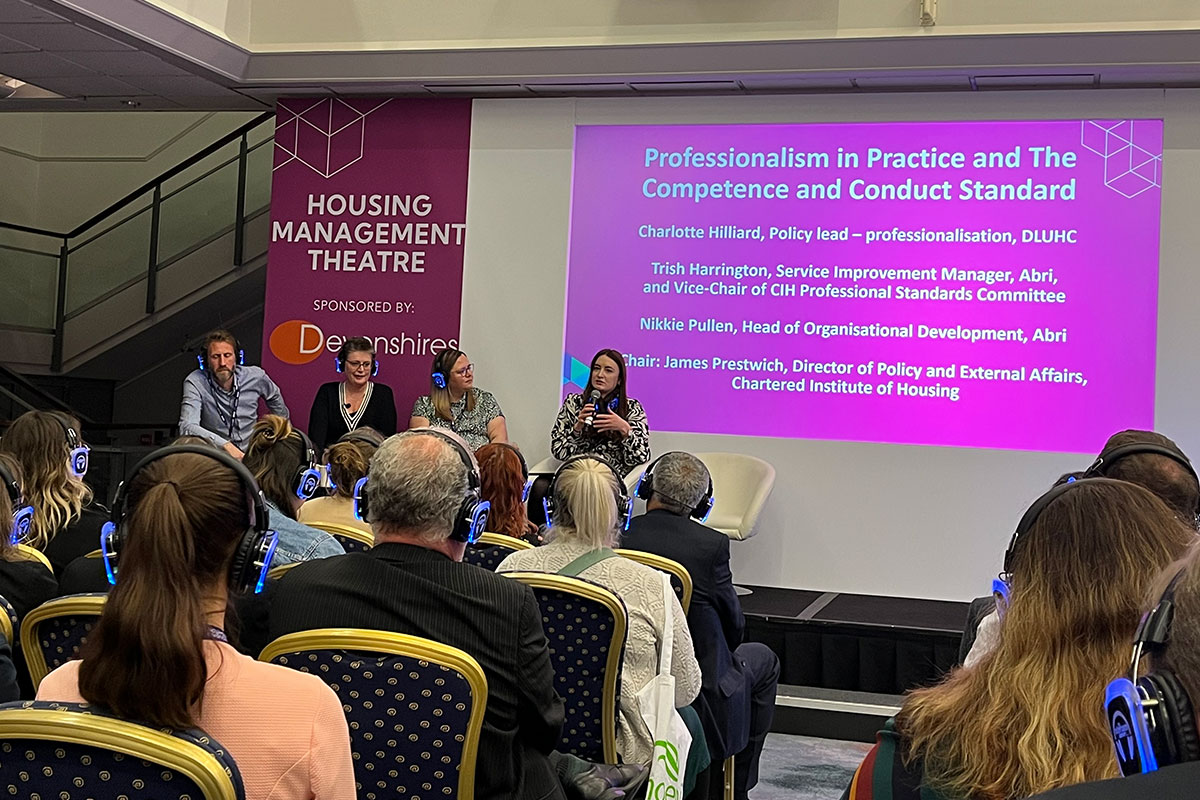You are viewing 1 of your 1 free articles
CIH Brighton: DLUHC officer grilled on competency standard says transition period ‘still under consideration’
The two-year transition phase for the new Competence and Conduct Standard is “definitely still under consideration”, a government officer confirmed at the Housing Brighton 2024 conference.

Charlotte Hilliard, policy lead for professionalism in social housing at the Department for Levelling Up, Housing and Communities (DLUHC), said the two-year period for managers to be enrolled in a course was not yet decided and that “we did hear that loud and clear through the consultation that people were very concerned about the impact of the timescales that have been set”.
She made the comments during a packed session on professionalisation at the Chartered Institute for Housing (CIH)’s annual conference in Brighton on Wednesday, during which she was grilled by audience members about their concerns.
DLUHC launched its consultation on a new standard at the end of March. It closed in early April and the government is still reviewing responses.
The proposals were announced in 2023 as part of the Social Housing (Regulation) Act, which is aimed at driving up sector standards post-Grenfell.
It will require an anticipated 25,000 senior housing managers to have a Level 4 housing qualification. Senior housing executives will need a foundation degree or Level 5 housing qualification.
The government proposed a two-year transition period for staff to be enrolled in courses and to have completed the qualification within three years.
It described the timeframe as “ambitious”, but one that “strikes the right balance between moving rapidly to professionalise the sector and improve the quality of services to tenants, while ensuring that providers can maintain their standards of service to tenants whilst staff undertake qualifications”.
However, sector bodies are concerned it is not enough time and have asked for a longer transition period. The CIH and National Housing Federation made requests for three and five-year transition periods respectively for mandatory housing qualifications.
During the conference session, audience member Lee Buss-Blair, director of operations at Riverside, said: “The CIH, the National Housing Federation, G15, Greater Manchester Housing Providers, ourselves, all were united on the potential impact of that two-year timeframe in relation to… the number of managers who would be out of the business at the same time and the potential impact that could have on our ability to deliver a quality service.
“The question is, is that still under consideration or have we landed on the two years?”
Ms Hilliard replied: “It’s definitely still under consideration. We did hear that loud and clear through the consultation that people were very concerned about the impact of the timescales that have been set.
“It’s two years to enrol, not to complete the course, so effectively it’s a three-year transition period for completion.
“But, obviously, we’ve heard from many respondents in the consultation that it’s going to be quite challenging. We’ve also heard that from qualification providers as well that it’s going to be challenging to deliver it on the scale needed.
“We have a very, very ambitious secretary of state. He wants to move really fast to implement some of these measures, not just competency and conduct but Awaab’s Law.
“What we can do is listen to those responses that we get from the presentation and they will be kept under consideration and we’ll release the final decision of some of those proposals later this year.”
Panel member Patricia Harrington, service improvement manager at Abri and vice-chair of the professional standards committee at the CIH, raised concerns about people who obtained qualifications years ago and were trying but failed to get documents or information on those courses from the universities they attended.
“They have the certificates, but don’t have the syllabus they covered,” she said.
Nikkie Pullen, head of organisational development at Abri, said the biggest pushback she has had is where people have been professionally assessed and still have to get the qualification.
Audience member Sarah Shaw, housing services director at Newlon Housing Trust, said that was “disappointing”.
She said: “I am one of those people who has spent quite a lot of time and effort demonstrating my professional competency.
“I’ve worked in the sector for 29 years. I am a chartered member of the institute of housing and worked really hard to get that qualification – that isn’t worth anything in this setting – and I have to do a Level Five qualification for a year to gain a qualification that I actually already have.
“I already am entitled to use the letters or CIHCM after my name.
“And while I’m not against learning – I’m here, I’m very into my continuing professional development and consider myself a professional and have demonstrated that – it’s really disappointing that the government organisation that is supposed to be thinking about housing doesn’t respect the fact that I have 29 years’ experience and I’m extremely professional.”
Ms Shaw said she remains hopeful that it will be recognised that “there are lots of us in this situation”.
“It’s a bit of a punch in the gut to be honest and I hope there’s a way around it.”
In response, Ms Hilliard said that “on the face of the legislation”, it requires that it will have to be a qualification.
“In order to address that it would be a case of exempting a whole host of people from being covered by the legislation,” she said, adding that “we are subject to ministerial decision-making… but things are still under consideration”.
“I don’t have a magic answer for you I’m afraid,” she said.
Sign up for our daily newsletter
Already have an account? Click here to manage your newsletters










